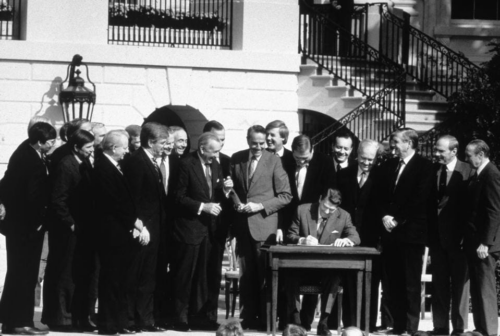Keystone Pipeline: Important Debate for Yesterday
04.10.2014
Listening to the Republicans in Congress, one might think that the Keystone XL pipeline is the biggest energy issue facing the country today and that swift approval of the controversial project is vital to America’s interests. Election-year politics aside, however, the merits of the case for the pipeline have been eclipsed by changing circumstances.
When the project was first proposed and the political battle lines were drawn, America was importing significantly more oil than we were producing. That is no longer the case. Thanks to the boom in shale and unconventional oil production, the United States is on the verge of becoming the world’s largest oil producer. From an energy security and geopolitical perspective, the Keystone pipeline has become largely irrelevant. The question today is not whether we should import heavy crude from Canada (supposedly as an alternative to importing from less friendly countries). The critical question today is what American should do with the glut of oil we are producing ourselves.
The arguments for the pipeline are rupturing. We no longer need Canada’s tar sands oil to enhance our “energy security.” This claim rested on the specious notion that having access to large sums of crude from close by would cushion U.S. consumers from price shocks at the pump. Even if this were true, the last time I checked North Dakota was closer to home than Alberta.
The only serious argument left to Keystone proponents is that building the pipeline and processing Canadian crude in the United States will create jobs. Given our painfully slow recovery, of course, that is not an argument to be taken lightly. But America’s new energy reality points to a different path toward a renewal of national prosperity. Instead of building a pipeline to import another country’s heavy and difficult crude, we should build pipelines to safely and economically move America’s own lighter, sweeter crude to market. Investing in revamped refinery capacity that is more suited to processing our own oil, as opposed to the heavy oils of Canada and Venezuela, would not only create jobs, but would be more consistent with our new place in the energy world. Such a course would make it easier to balance the twin imperatives of spurring domestic economic growth and competitiveness and lowering U.S. greenhouse gas emissions.
On the merits, we should put this anachronistic debate to bed. We have far more important energy policy questions to discuss that are actually rooted in the facts and circumstances of today.
Should we lift the ban on exports of petroleum? This issue raises a host of questions, but global oil market dynamics suggest that the ban is itself anachronistic. I have concerns that added incentives to extract domestic oil could have negative environmental impacts, but we can manage those and can extract great value from our domestic resources without sacrificing environmental best practices and without opening up currently protected areas to development. Further, I am attracted to the idea of dedicating a fraction of export revenue to conservation and clean energy (which we did when we opened up offshore resources), as the think tank Third Way has proposed.
Can we come to consensus on natural gas exports in light of new resource and global political realities? I favor exports, but not at the expense of reasonable environmental safeguards around fracking that will not in any significant way deter responsible developers from producing the resource.
And we must put climate change back on the national energy policy agenda. If the Keystone debate has served any purpose, it has helped opponents raise the volume (if not always the quality) of the discourse around climate. XL opponents feel strongly that America should not abet exploitation of the difficult-to-develop and energy-intensive tar sands, lest we be complicit in the negative climate impacts that would result. I happen to agree with that argument, but the real question now is this: As U.S. oil production surges, why should our political leaders keep fighting over a project we simply don’t need?
While it likely won’t happen until the silly season of the midterm elections is over, we need to focus our energy debates on the issues that matter today. That will be enough of a challenge without spilling blood over yesterday’s battles.
This op-ed was originally published by Real Clear Politics, read it on their website here.







